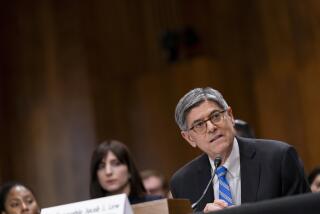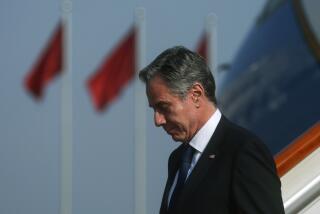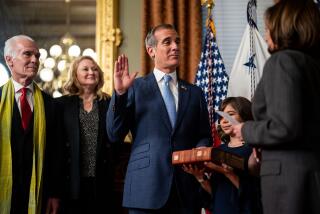Senate OKs U.N. Envoy as Iraq Ambassador
WASHINGTON — The Senate on Thursday easily confirmed John D. Negroponte as the first U.S. ambassador to postwar Iraq, with senators stressing that his job had become “exponentially” more difficult because of the recently revealed abuses of Iraqi prisoners in U.S. custody.
Although the subject of the five-hour debate was Negroponte’s confirmation, which the Senate approved, 95-3, senators from both parties spent a majority of the time condemning the treatment of Iraqi prisoners and talking about the scandal’s ramifications on the outcome of the U.S.-led war in Iraq.
Sen. Joseph R. Biden Jr. of Delaware, ranking Democrat on the Foreign Relations Committee, said he could not remember the Senate confirming anyone for a post when the “degree of difficulty of accomplishing a mission have been as high and the stakes have been as profound.”
“These horribly degrading abuses of jailed Iraqis have made the problem exponentially worse,” he said.
Several Republican senators agreed that Negroponte’s challenge -- immense to begin with -- now would be much greater.
“We have a real problem because of mistakes that Americans made,” Sen. Jon Kyl (R-Ariz.) said. “The ambassador will have a very difficult job ahead of him.”
Republican Sen. Sam Brownback of Kansas said, “The damage done to our credibility in Iraq and the Middle East is going to be difficult to rebuild.”
Negroponte, now serving as U.S. ambassador to the United Nations, will head to Baghdad at a crucial stage of the Iraq conflict. Reconstruction efforts have stalled because of a persistent and widespread insurgency, and Iraqis’ tolerance of the U.S.-led occupation of their country has waned significantly.
A career diplomat with more than four decades of experience, Negroponte will oversee what is expected to be the largest U.S. embassy in the world, with a staff of 3,000.
Democrats charged that the Bush administration had made the situation almost impossible for Negroponte by making one mistake after another -- from launching the war without a broad international coalition to the scandal over prisoner abuse.
“The tragedy unfolding in Iraq is the direct result of a colossal failure of leadership,” said Sen. Edward M. Kennedy (D-Mass.). “The president has failed the Iraqi people, and he has failed America.”
Biden said the president should respond by launching a new, clear strategy to help Iraq make the transition to a secure nation, led by a representative government, that is no threat to its neighbors.
He suggested tearing down Abu Ghraib prison, one of the sites of the abuse. He also advocated increasing the presence of U.S. troops to restore security and then replacing them with a multinational force led by the North Atlantic Treaty Organization and endorsed by the U.N.
Because of senators’ concern over the situation in Iraq, Negroponte’s confirmation flew through the Senate, even as dozens of other administration nominations are awaiting an initial committee hearing. California Sens. Barbara Boxer and Dianne Feinstein, both Democrats, voted for Negroponte.
By contrast, his confirmation hearing for the U.N. post in 2001 was delayed by Democrats because of questions about his human rights record as ambassador to Honduras in the 1980s. He was confirmed after the Sept. 11 terrorist attacks, which made it critical for the U.S. to have an ambassador to the world body.
On Thursday, Sen. Tom Harkin (D-Iowa) was the only senator who said that Negroponte’s record in Honduras made him the wrong choice to represent the country in Iraq. He accused the nominee of lying to his bosses and to Congress about the death squads that were responsible for the disappearance of 184 people, including an American priest, while he was ambassador to Honduras.
“Ambassador Negroponte turned a blind eye and a deaf ear to the human rights abuses in Honduras,” Harkin said. “To send Mr. Negroponte to Iraq would send entirely the wrong message at this time.”
More to Read
Get the L.A. Times Politics newsletter
Deeply reported insights into legislation, politics and policy from Sacramento, Washington and beyond. In your inbox three times per week.
You may occasionally receive promotional content from the Los Angeles Times.










